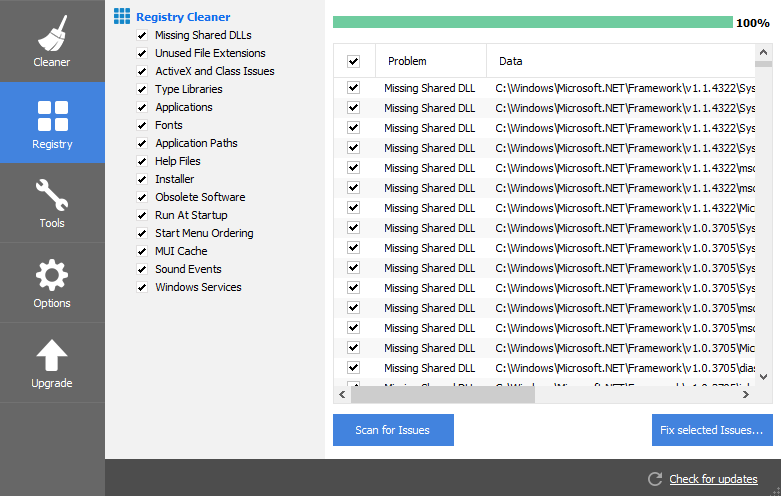

- #WINDOWS REGISTRY CLEANER BY MICROSOFT SOFTWARE#
- #WINDOWS REGISTRY CLEANER BY MICROSOFT PC#
- #WINDOWS REGISTRY CLEANER BY MICROSOFT WINDOWS 7#
You would then need to load into Recovery Console and reload the backup of your registry to return Windows into good working order. I would strongly recommend backing up your registry before performing cleans, and reviewing the results of the registry cleaner scan prior to removingĪ worst case scenario with a Registry Cleaner (if you made backups before cleaning) would be Windows failing to load.

There is definitely risk involved when using a registry cleaner as legitimate items can be removed. Hence, Tim's assessment of performance increase may be due to one of such packaged tools. To reduce system resource usage in Windows (generally taking out bells and whistles in order to improve performance). Tools such as disk cleanup, disk defragmentation, Windows services modification tools, startup program management, or other registry tweaks That being said, most Registry Cleaner programs offer other packaged tools that can improve system performance. In this condition, the MVP and Moderator are correct.
#WINDOWS REGISTRY CLEANER BY MICROSOFT WINDOWS 7#
Windows 7 however, skips over invalid or unused registry keys during boot, so registry cleaners will generally have no effect. The reason for this is that Windows will load the registry (including invalid or unused keys). Registry Cleaners can have positive performance results in Windows XP and older systems as far as boot time is concerned. I must disagree with the MVP and Moderator on this one. Please note: The Hibernation function will be unavailable after this operation. On the "Hibernate" tab, click to clear the check box beside "Enable hibernation" and click "OK".

Click "Start", click "Run", input "POWERCFG.CPL" (without quotation marks) and press "Enter". You can manually set the size of the Paging file.ġ. On the "Advanced" tab, click the "Change" button in the "Virtual memory" section. On the "Advanced" tab, click the "Settings" button in the "Performance" section. Click "Start", click "Run", input "sysdm.cpl" (without quotation marks) and press "Enter". Method 2: Set Paging file to be smaller or move the paging file to another partition.ġ. Click "OK", and then click "Yes" to confirm the deletion. Click to select the "Temporary files" and "Temporary Internet Files" check boxes. Click "C:" (or whatever drive on which Windows is installed), and then click "OK". Click "Start", click "Run", input "cleanmgr.exe" (without quotation marks), and then press "Enter". In order to free disk space, you can try the following methods:ġ. Read Ken Blake, Microsoft MVP (Windows Desktop Experience) since 2003 The risk of a serious problem caused by a registry cleaner erroneously removing an entry you need is far greater than any potential benefit it may have.
#WINDOWS REGISTRY CLEANER BY MICROSOFT SOFTWARE#
Despite what many people think, and what vendors of registry cleaning software try to convince you of, having unused registry entries doesn't really hurt you. Leave the registry alone and don't use any registry cleaner. Cleaning of the registry isn't needed and is dangerous. Registry cleaning programs are *all* snake oil. The size of the registry has no effect on the computer's speed.
#WINDOWS REGISTRY CLEANER BY MICROSOFT PC#
On Thu, 13:11:55 +0000, C_Thakar wrote: > The reason is that as registry gets bigger, it slows PC down.


 0 kommentar(er)
0 kommentar(er)
